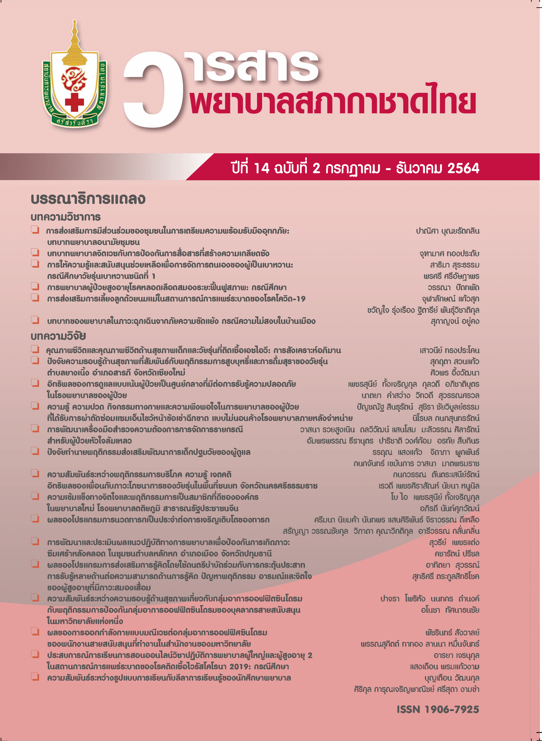Factors predicting behaviors of caregivers in promoting early childhood development
Keywords:
predicting factors, promoting child development, early childhood, caregiverAbstract
The purpose of this study was to examine factors predicting behaviors of caregivers in promoting early childhood development based on the Pender’s Health Promotion Model. One hundred twenty parents (caregivers) of children from 1 to 4 years old were randomly selected, and then stratified according to the population of each village (162 parents from 7 villages). The self-report instruments were: 1) sociodemographic questionnaire, 2) perceived benefits of promoting child development questionnaire, 3) perceived self-efficacy questionnaire, 4) perceived barriers to promoting child development questionnaire, and 5) child development behavior promotion questionnaire. The Cronbach's alpha coefficients for internal reliability were 0.89, 0.92, 0.93, and 0.84 respectively. The data were analyzed using descriptive statistics (percentages, means, and standard deviations) and multiple regression. Results showed that the caregivers had a high level of perceived behaviors promoting early childhood development ( = 3.02, SD=0.49). Perceived benefits (β = .337, p < .05) and self-efficacy (β = .321, p < .05) together significantly predicted caregivers’ perceived behaviors (R2 = .264, p <.05). The results can be used as empirical evidence for nurses and health personnel in promoting perceived benefits and self-efficacy in caregivers in promoting early childhood development.
References
UNICEF Thailand. Early childhood development [Internet]. 2018 [cited 2018 Nov 27] Available from : https://uni.cf/3ezHoB6 (in Thai)
Thai Health Promotion Foundation. Opening the situation of early childhood found one-thirds developmental delays [Internet]. (n.d.). [cited 2018 Nov 27] Available from: http://www.qlf.or.th/Home/Contents/812 (in Thai)
Department of Children and Youth. Ministry of Social Development and Human Security. Child and youth development report 2017 [Internet]. 2018 [cited 2018 Nov 21]. Available from: https://bit.ly/2WowVCs (in Thai)
Kue-iad N, Chaimay B, Woradet S. Early childhood development among Thai children aged under 5 years: a literature review. The Southern College Network Journal of Nursing and Public Health 2018;5(1):281-96 (in Thai)
Rajanukul Institute. Manual for development of child development equipment, newborn - 5 years [Internet]. 2012 [cited 2018 Nov 21] . Available from https://th.rajanukul.go.th/_admin/file-download/5-4535-1449802545.pdf (in Thai)
Noijaiboon S. Effectiveness of the promoting infant development on parental knowledge, self efficacy, and promotive behavior for infant development [Thesis]. Bangkok: Mahidol University; 2002. (in Thai)
Plodkornburee J. Promoting child development behaviors of family caregivers. In: Department of Health promotion hospital, Health center 5, [Research]. Nakorn Ratchasima: Department of Health; 2012. (in Thai)
Manowong W. Perceived benefit, self-efficacy and developmental promotion behaviors among mothers of toddlers [Thesis]. Chiang Mai: Chiang Mai University; 2007. (in Thai)
Thawitha L, Klunklin P, Urharmnuay M. Preterm Infant development promoting behaviors among primary caregivers and related factors. Nursing Journal 2016;43(4):12-22. (in Thai)
Thisara P, Ponmark J, Seekhao P, Sinlapawitthayathon B. Predictive factors of parental behaviors on promoting early childhood development in Phayao Province. Journal of Nursing and Health Care 2017;35(2):169-76. (in Thai)
Sonsee S, Pongjaturawit Y, Chaimongkol N. Factors associated with maternal behavior in promoting play for their preschool children. Journal of Phrapokklao Nursing College 2017;28(1):90-9. (in Thai)
Sakolwasan U. Knowledge, self-efficacy, and behaviors in promoting preterm infant development among primary caregivers [Thesis]. Chiang Mai: Chiang Mai University; 2007. (in Thai)
Pender NJ, Murdaugh CL, Parsons MA. Health promotion in nursing practice. 4th ed. New Jersey: Pearson Education; 2002.
Yakasem P, Chaimongkol N, Pongjaturawit Y. Experience of becoming a Thai early adolescent mother. Journal of The Royal Thai Army Nurses 2018;19(3):89-96. (in Thai)
Patpongtorn J. The 6th report of the study of factors effecting the development of early childhood in Thailand, 2017 [Internet]. 2018 [cited 2019 Jan 12]. Available from: http://cgtoolbook.com/books003/ (in Thai)
National Institute of Child Health. Parenting guidelines promote development and learning of children under 3 years old. Nonthaburi; C G TOOLS; 2018. (in Thai)
The Royal College Pediatricians of Thailand. A parent's guide to disseminate knowledge of early childhood care and development for 0-3 years [internet]. (n.d.). [cited 2020 Jan 13]. Available from: http://www.thaipediatrics.org/Media/media-20171010123052.pdf (in Thai)
Pengsatid U. Developmental psychology. 9th ed. Bangkok: Ramkhamhaeng University Press; 2014. (in Thai)
Pitipat A, Bhokkhaphabhubeth S, Khamsripon C, Reungworaboon S. Factors related to behaviors promoting toddler’s growth and development of toddler caregivers. Journal of Boromarajonani College of Nursing, Bangkok 2018;34(3):1-10. (in Thai)
Downloads
Published
Issue
Section
License
Copyright (c) 2022 Srisavarindhira Thai Red Cross Institute of Nursing

This work is licensed under a Creative Commons Attribution-NonCommercial-NoDerivatives 4.0 International License.
เนื้อหาบทความหรือข้อคิดเห็นต่างๆ ในวารสารพยาบาลสภากาชาดไทยนี้ เป็นความคิดเห็นของผู้เขียนบทความ ไม่ใช่ความเห็นของกองบรรณาธิการ หรือสถาบันการพยาบาลศรีสวรินทิรา สภากาชาดไทย






